The Patrick Hamilton Appreciation Society discussion

This topic is about
Ted Lewis
Hamilton-esque books, authors..
>
Ted Lewis
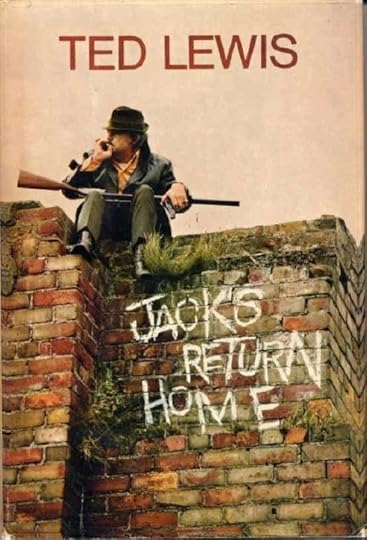
The Artistry of Ted Lewis by Brian Greene
Years ago I mentioned during a conversation with a friend that a particular writer or filmmaker I admired just seemed to have that inborn artistic temperament. My friend challenged me to define what it means for a person to have that capacity, and I struggled to form an explanation—it’s one of those things you see clearly in your mind’s eye but have a hard time putting into words. What I didn’t realize then, but know now, is that I could have simply answered, “It’s what Ted Lewis had.”
Ted Lewis was a guy who had artistry coming out his pores. He first began expressing himself creatively as a young boy, decades before he wrote Jack’s Return Home, the brilliant and influential 1970 novel that established his still-strong reputation as the originator of the British school of hard-boiled crime fiction. Born in 1940 in the Manchester suburb of Stretford and raised for the most part in the small north Lincolnshire town of Barton-Upon-Humber, Lewis showed himself to have a keenly creative mind from his earliest days. In addition to writing fiction he was an artist and a musician, and although he never worked directly in film, he was a cinema buff forever fascinated by everything having to do with the movies.
The rest of the article is here...
http://www.mulhollandbooks.com/2010/0...

Ted Lewis: Noir Maverick by Brian Greene
Lots of people know about the landmark 1971 British gangland film Get Carter (and if you’re a crime fiction/film enthusiast who doesn’t: stop here, go watch it, then come back and read this later). But too few have been hipped to Ted Lewis, the author of the novel that served as that movie’s basis. Lewis was a noir maverick, the originator of the British school of hardboiled crime fiction. He is the U.K.’s answer to Dashiell Hammett and Raymond Chandler. David Peace is just one of the legion of contemporary Brit Grit authors who cite him as an influence. He was also a fascinating, if ultimately tragic, guy: a multi-talented man gifted with artistic genius, and a good-looking bloke with the ability to be a great charmer; but also someone with a dark side, who was limited by a debilitating addiction to alcohol.
Like Jack Carter, the mob enforcer who is the lead character of Get Carter (Jack’s Return Home is the original name of Lewis’s 1970 novel), Lewis came from the North of England and lived in London as an adult. Growing up in the small town of Barton-Upon-Humber, Lewis showed himself to have an artistic bent from his earliest years. A lifelong visual artist, Lewis was rarely found without his sketchpad through his boyhood years. His cousin Alf remembers a time when their families were together at one of their homes and nobody could find Ted (Edward then). Alf finally discovered his cousin up in an attic, watching a hard rain come down, and intently drawing in his omnipresent pad. Alf asked Edward what he was doing, and got the matter-of-fact response, “Drawing the storm.” The case can be made that drawing the storm is precisely what Lewis the author was up to when writing novels as an adult. Prodded on by an influential grammar school teacher who was a published author, a teenaged Lewis wrote some short stories for the school’s annual magazine; the stories are stunningly good, and surprisingly intense, to have come off the pen of someone that age. Lewis was also a musician who mostly played jazz piano.
The rest of the article is here:
http://www.criminalelement.com/blogs/...
Ted Lewis by Brian Greene
And yet another article by Brian Greene - this time a book-by-book review of Ted Lewis's bibliography....
These things always come into play in Ted Lewis's crime novels:
* Music
* Pornography
* Revenge
* Homosexuality
* Violence
* Drinking (people never stop drinking, at all times of day and night)
* Car Names
* Rivalry
* Hideouts
* People taking baths while cooling out after a big crime
Something else that makes Lewis's books stand out is that there are generally no characters in them that are likeable. With Chandler and Macdonald you've got their narrators/consciences Marlowe and Archer, with Thompson you are usually cheering for somebody who has been taking guff from bad people for too long and is now out to get his. But in the novels of Ted Lewis, most everybody is rotten. You might root for Jack Carter as he sets about getting revenge on the people who killed his innocent brother, but you don't really like Carter, because you know that if you got in his way he would simply pop your head off. Somehow the lack of a hero in these books gives them a deeper dimension than what you get in the stories with heroes, even if those are anti-heroes.
The whole article is here:
http://www.allanguthrie.co.uk/pages/n...
And yet another article by Brian Greene - this time a book-by-book review of Ted Lewis's bibliography....
These things always come into play in Ted Lewis's crime novels:
* Music
* Pornography
* Revenge
* Homosexuality
* Violence
* Drinking (people never stop drinking, at all times of day and night)
* Car Names
* Rivalry
* Hideouts
* People taking baths while cooling out after a big crime
Something else that makes Lewis's books stand out is that there are generally no characters in them that are likeable. With Chandler and Macdonald you've got their narrators/consciences Marlowe and Archer, with Thompson you are usually cheering for somebody who has been taking guff from bad people for too long and is now out to get his. But in the novels of Ted Lewis, most everybody is rotten. You might root for Jack Carter as he sets about getting revenge on the people who killed his innocent brother, but you don't really like Carter, because you know that if you got in his way he would simply pop your head off. Somehow the lack of a hero in these books gives them a deeper dimension than what you get in the stories with heroes, even if those are anti-heroes.
The whole article is here:
http://www.allanguthrie.co.uk/pages/n...
And here's where we came in...
Mark wrote: "Here's a bit of news that I've been waiting quite a long time to hear, and reckon there'll be at least one semi-interested party here amongst us.
Beginning in late 2014, a publishing house trading under the name Soho Syndicate will usher in the return of some long-out-of-print absolute classics by my very favourite British crime writer, Ted Lewis. His novels command stupid prices on eBay, on the rare occasion that they actually manage to turn up, so this is very welcome news to those of us with more taste than cash.
So, what've we got? The first three releases -- released on a staggered schedule -- will be the classic Jack Carter Trilogy:
Get Carter [1970, originally published as Jack's Return Home]
Jack Carter's Law [1974]
Jack Carter and the Mafia Pigeon [1977]
Special offer... I'll personally refund any unsatisfied purchasers. "
Mark wrote: "Here's a bit of news that I've been waiting quite a long time to hear, and reckon there'll be at least one semi-interested party here amongst us.
Beginning in late 2014, a publishing house trading under the name Soho Syndicate will usher in the return of some long-out-of-print absolute classics by my very favourite British crime writer, Ted Lewis. His novels command stupid prices on eBay, on the rare occasion that they actually manage to turn up, so this is very welcome news to those of us with more taste than cash.
So, what've we got? The first three releases -- released on a staggered schedule -- will be the classic Jack Carter Trilogy:
Get Carter [1970, originally published as Jack's Return Home]
Jack Carter's Law [1974]
Jack Carter and the Mafia Pigeon [1977]
Special offer... I'll personally refund any unsatisfied purchasers. "
My New Favourite Author: Ted Lewis
from 'What are you reading for..?' blog
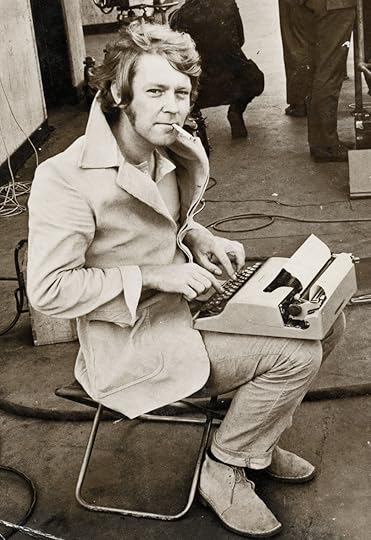
Three weeks ago, I’d heard of Ted Lewis but not read any of his work. Now, in quick succession, I’ve finished both GBH (his final novel, published in 1980), which I picked up for the steal-of-the-century price of 10p; and also Jack’s Return Home (Lewis’s second novel, which came out in 1970; it’s often published under the title of the Michael Caine film it inspired, Get Carter), which I found in my local library.
I enjoyed both books very much. They’re violent (tick), relatively short (tick), have a strong sense of place (tick), and feature male protagonists who are relentless in the pursuit of their goal (big tick). In Jack’s Return Home, Jack Carter travels from London back to Doncaster to investigate his brother’s sudden death. GBH is the story of porn king George Fowler, who learns he is being ripped off by one of his lieutenants, and sets out to find the guilty man. Both protagonists are driven by revenge, although for different reasons: Carter’s stems at least partly from guilt, whilst Fowler sees his authority threatened, and at a time when the threat from a rival firm has only recently been quelled. For both men, their desire to uncover the truth comes at a very high personal cost.
The whole article is here:
http://whatareyoureadingfor.wordpress...
from 'What are you reading for..?' blog

Three weeks ago, I’d heard of Ted Lewis but not read any of his work. Now, in quick succession, I’ve finished both GBH (his final novel, published in 1980), which I picked up for the steal-of-the-century price of 10p; and also Jack’s Return Home (Lewis’s second novel, which came out in 1970; it’s often published under the title of the Michael Caine film it inspired, Get Carter), which I found in my local library.
I enjoyed both books very much. They’re violent (tick), relatively short (tick), have a strong sense of place (tick), and feature male protagonists who are relentless in the pursuit of their goal (big tick). In Jack’s Return Home, Jack Carter travels from London back to Doncaster to investigate his brother’s sudden death. GBH is the story of porn king George Fowler, who learns he is being ripped off by one of his lieutenants, and sets out to find the guilty man. Both protagonists are driven by revenge, although for different reasons: Carter’s stems at least partly from guilt, whilst Fowler sees his authority threatened, and at a time when the threat from a rival firm has only recently been quelled. For both men, their desire to uncover the truth comes at a very high personal cost.
The whole article is here:
http://whatareyoureadingfor.wordpress...
Writer Nick Triplow on words, deeds and rock & roll..
Ted Lewis & Get Carter
Ted Lewis didn’t live long enough to witness his enduring influence as a writer of what can loosely be termed Brit-noir. His legacy for the most part is as the author of the novel Jack’s Return Home, the book that became Get Carter. The1971 screen version of Lewis’s novel, starring Michael Caine, rightly has its place in the British film canon, but the elements that make it work are all evident in Lewis’s book.
There were many sides to Ted Lewis. A gifted illustrator who won prizes at Barton Grammar School where he was tutored in English by poet, novelist, and critic, Henry Treece - an influential associate of Dylan Thomas. Lewis was also a jazz musician who played piano throughout his life, plying his trade in the smoky clubs of Kingston-upon-Hull and Leeds whilst a student at Hull College of Art. An obsessive film buff, Lewis would dearly loved to have been a director himself.
Departing for London in the early 1960s, Lewis had a series of jobs, finally working as animation clean-up supervisor, recreating film cells for the Beatles’ Yellow Submarine movie. Lewis married in 1966 and was living in rural Essex with his wife and young daughters when, in 1971, the world he had created – based in and around his adolescent haunts of Scunthorpe became celluloid gold in the Mike Hodges’ directed film Get Carter.
Get Carter was striking. Unafraid, tough and unflinching, it ushered in a new kind of truth about the Britain of the early 70s. Carter's world is the bleak north east in the hands of developers and dodgy councillors. Lewis could never have imagined that his book, its story fermented during shifts as an animator on Yellow Submarine and in the pubs of Soho would carry such cultural significance 40 years later.
Tragically, Lewis died in 1982 at the age of 42, a victim of the conflicted world he created, precariously and tragically balanced between the quiet family life he sought and the brutal anti-heroes he depicted so convincingly in a series of dark crime novels.
There was, and is, a great deal more to Ted Lewis than Jack Carter.
From: http://nicktriplow.blogspot.co.uk/201...
Nick Triplow s the writer of south London set crime noir novel Frank's Wild Years.
He has written a number of pieces of short fiction and the social history books, The Women They Left Behind and Distant Water.
He co-wrote the script for Ted’s Return Home, a short film about Ted Lewis, author of classic British crime novel Jack’s Return Home (filmed as Get Carter).
Originally from south London, now living in Barton Upon Humber, Nick is currently completing his biography of Ted Lewis and working on new fiction.
Ted Lewis & Get Carter
Ted Lewis didn’t live long enough to witness his enduring influence as a writer of what can loosely be termed Brit-noir. His legacy for the most part is as the author of the novel Jack’s Return Home, the book that became Get Carter. The1971 screen version of Lewis’s novel, starring Michael Caine, rightly has its place in the British film canon, but the elements that make it work are all evident in Lewis’s book.
There were many sides to Ted Lewis. A gifted illustrator who won prizes at Barton Grammar School where he was tutored in English by poet, novelist, and critic, Henry Treece - an influential associate of Dylan Thomas. Lewis was also a jazz musician who played piano throughout his life, plying his trade in the smoky clubs of Kingston-upon-Hull and Leeds whilst a student at Hull College of Art. An obsessive film buff, Lewis would dearly loved to have been a director himself.
Departing for London in the early 1960s, Lewis had a series of jobs, finally working as animation clean-up supervisor, recreating film cells for the Beatles’ Yellow Submarine movie. Lewis married in 1966 and was living in rural Essex with his wife and young daughters when, in 1971, the world he had created – based in and around his adolescent haunts of Scunthorpe became celluloid gold in the Mike Hodges’ directed film Get Carter.
Get Carter was striking. Unafraid, tough and unflinching, it ushered in a new kind of truth about the Britain of the early 70s. Carter's world is the bleak north east in the hands of developers and dodgy councillors. Lewis could never have imagined that his book, its story fermented during shifts as an animator on Yellow Submarine and in the pubs of Soho would carry such cultural significance 40 years later.
Tragically, Lewis died in 1982 at the age of 42, a victim of the conflicted world he created, precariously and tragically balanced between the quiet family life he sought and the brutal anti-heroes he depicted so convincingly in a series of dark crime novels.
There was, and is, a great deal more to Ted Lewis than Jack Carter.
From: http://nicktriplow.blogspot.co.uk/201...
Nick Triplow s the writer of south London set crime noir novel Frank's Wild Years.
He has written a number of pieces of short fiction and the social history books, The Women They Left Behind and Distant Water.
He co-wrote the script for Ted’s Return Home, a short film about Ted Lewis, author of classic British crime novel Jack’s Return Home (filmed as Get Carter).
Originally from south London, now living in Barton Upon Humber, Nick is currently completing his biography of Ted Lewis and working on new fiction.
I've been corresponding with Nick Triplow. He is currently completing a biography of our favourite Brit-noir novelist Ted Lewis.

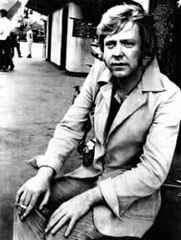
Nick has also set up this Ted Lewis Facebook page, it'll be the place to keep an eye on for Ted Lewis news in the forthcoming months.
Nick Triplow will also be posting updates on his Nick Triplow twitter feed too.
This is Nick's blog.
Nick hopes to make an announcement about the book in the not too distance future. I'll post on here when I hear anything.


Nick has also set up this Ted Lewis Facebook page, it'll be the place to keep an eye on for Ted Lewis news in the forthcoming months.
Nick Triplow will also be posting updates on his Nick Triplow twitter feed too.
This is Nick's blog.
Nick hopes to make an announcement about the book in the not too distance future. I'll post on here when I hear anything.

By the by, Nick Triplow also mentioned that...
"Pretty much all of Ted Lewis's work is worth reading. GBH especially, in my view, set the tone for much of the modern crime/noir fiction which currently shifts loads in bookshops."
I can't find a copy for less that £40. A great shame because it sounds wonderful (as does Plender).
Just started Get Carter by Ted Lewis.
And as recommended by our very own Mark.
Great crime writing - taught and hard-boiled. A classic noir vibe. Hard not to have the film in my mind as I read the story.
So far so wonderful.
"Get Carter remains among the great crime novels, a lean, muscular portrait of a man stumbling along the hard edge — toward redemption. Ted Lewis cuts to the bone."
- James Sallis, author of Drive
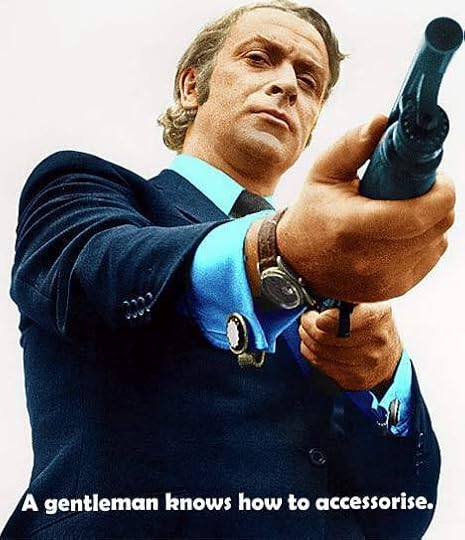
And as recommended by our very own Mark.
Great crime writing - taught and hard-boiled. A classic noir vibe. Hard not to have the film in my mind as I read the story.
So far so wonderful.
"Get Carter remains among the great crime novels, a lean, muscular portrait of a man stumbling along the hard edge — toward redemption. Ted Lewis cuts to the bone."
- James Sallis, author of Drive

 Nigeyb wrote: "Great crime writing - taught and hard-boiled. A classic noir vibe. Hard not to have the film in my mind as I read the story."
Nigeyb wrote: "Great crime writing - taught and hard-boiled. A classic noir vibe. Hard not to have the film in my mind as I read the story."So long as you're not referring to the Stallone version, that ain't no bad thing!
Really glad to hear that you're enjoying the novel, though hardly surprised. I'm always ready [and willing and able] to shout about Ted Lewis, and I'm hoping that this one leaves you hungry for more.
^ That Stallone version never got a theatrical release in the UK. Even if (and I'm assuming this is not the case) it was even vaguely passable, it's still sacrilege trying to remake such a classic film.
Mark wrote: "Really glad to hear that you're enjoying the novel"
Oh yes. Superb. Though now it's past tense. I've just finished.
Click here to read my review.
Having seen the original 1971 classic film version of "Get Carter" umpteen times over the years it was impossible for the film portrayals not to completely inform the story's characters in my mind's eye. This familiarity also meant the story held few surprises (though there are some interesting points of divergence). I would rather have approached this book without these preconceptions.
Like anyone needs me to tell them, this is a classic 'avenging angel' tale, and Jack Carter, the avenging angel, will not rest until there is full restitution for some serious sins.
Putting the film to one side, the book stands on its own merits. What Ted Lewis achieves brilliantly, in common with all great genre fiction, is to say something else about the world. In this instance he evokes the late 1960s, and the Britain I remember vividly as I grew up in the 1970s. A violent, bored, depressed place trying to come to terms with the slow death of traditional industries and pre-War certainties.
Ted Lewis also skewers that ambiguous strata of society where criminality and respectability combine. This a world where very nasty things happen - brutality, exploitation and casual violence are the norm. "Get Carter" nails the grim humour, the squalor, the boozers, the snooker halls, the fights whilst telling its compelling tale of revenge and family loyalty. The reason the film is such an enduring classic is because Ted Lewis wrote "Jack's Return Home" (retitled "Get Carter" after the film was released), a perfect crime novel, and essential reading.
Now I've just got to track down other books by Ted Lewis, all of which, apart from this one, are currently out of print. Though the other two in the Jack Carter trilogy are being republished this Autumn. Joy is unconfined!
By the by, anyone who enjoys this book, and is looking for something with similar qualities, should read Derek Raymond's Factory novels. We have our very own DR thread here are TPHAS...
https://www.goodreads.com/topic/show/...
Mark wrote: "Really glad to hear that you're enjoying the novel"
Oh yes. Superb. Though now it's past tense. I've just finished.
Click here to read my review.
Having seen the original 1971 classic film version of "Get Carter" umpteen times over the years it was impossible for the film portrayals not to completely inform the story's characters in my mind's eye. This familiarity also meant the story held few surprises (though there are some interesting points of divergence). I would rather have approached this book without these preconceptions.
Like anyone needs me to tell them, this is a classic 'avenging angel' tale, and Jack Carter, the avenging angel, will not rest until there is full restitution for some serious sins.
Putting the film to one side, the book stands on its own merits. What Ted Lewis achieves brilliantly, in common with all great genre fiction, is to say something else about the world. In this instance he evokes the late 1960s, and the Britain I remember vividly as I grew up in the 1970s. A violent, bored, depressed place trying to come to terms with the slow death of traditional industries and pre-War certainties.
Ted Lewis also skewers that ambiguous strata of society where criminality and respectability combine. This a world where very nasty things happen - brutality, exploitation and casual violence are the norm. "Get Carter" nails the grim humour, the squalor, the boozers, the snooker halls, the fights whilst telling its compelling tale of revenge and family loyalty. The reason the film is such an enduring classic is because Ted Lewis wrote "Jack's Return Home" (retitled "Get Carter" after the film was released), a perfect crime novel, and essential reading.
Now I've just got to track down other books by Ted Lewis, all of which, apart from this one, are currently out of print. Though the other two in the Jack Carter trilogy are being republished this Autumn. Joy is unconfined!
By the by, anyone who enjoys this book, and is looking for something with similar qualities, should read Derek Raymond's Factory novels. We have our very own DR thread here are TPHAS...
https://www.goodreads.com/topic/show/...
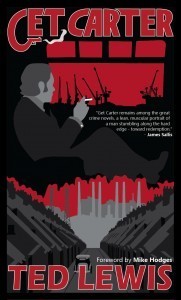
The publishing industry may be in the midst of full-scale upheaval, but intrepid souls are still setting up shop to offer good books to interested readers.
The latest example is Paul Oliver. Once a bookstore owner in Philadelphia, he dreamed for years of starting his own publishing company. This fall, he’s rushing in where angels fear to tread and launching Syndicate Books. (No fool, he’ll keep his day job as director of marketing and publicity for Soho Press, which has agreed to distribute his titles.)
Initially, Syndicate will focus on out-of-print mysteries and crime fiction. The first novel, coming in September, will be Ted Lewis’s ”Get Carter” (originally titled “Jack’s Return Home”), which has been unavailable in the U.S. for 40 years. “Lewis is now considered a pioneer of the British noir school,” Oliver says. “Everyone from Guy Ritchie to David Peace to Dennis Lehane cites him as supremely influential. Lucky for me, their emphatic blurbs wrap the book.” Mike Hodges, who directed the 1971 film version starring Michael Caine, has written an introduction.
Syndicate plans to publish all nine of Lewis’s novels — the result of “a couple of years” of negotiation with the Ted Lewis estate.
Oliver says, “Syndicate will target authors and books that have truly been lost or unavailable. I want readers to pick up a Syndicate title and say, ‘How didn’t I know about this?’ ”
Publishing is, as the old saying goes, a good way to make a small fortune — from a large one. But Oliver knows the business from all sides and plans to start cautiously. “I’m not going to be out-bidding Knopf for any projects in the near future,” he says. Syndicate will release five to 10 titles a year. Some will be only be released as e-books, which lowers the financial risk. For the first three titles this fall, he’ll print 7,500 paperback copies of each.
For now, Oliver is Syndicate’s only employee, but having his books distributed by Soho, which is, in turn, distributed by Penguin Random House, is a tremendous advantage that most start-ups don’t have.
Battling the flu and misspelled jacket designs and the thousand natural shocks that publishing is heir to, Oliver still sounds overjoyed: “A dream I’ve had for the last 10 years is being made a reality.”
It’s no mystery why.
http://www.washingtonpost.com/blogs/s...
How welcome is this part....?
Syndicate plans to publish all nine of Lewis’s novels — the result of “a couple of years” of negotiation with the Ted Lewis estate.
:-)))
Soho Syndicate reissues US links and covers...
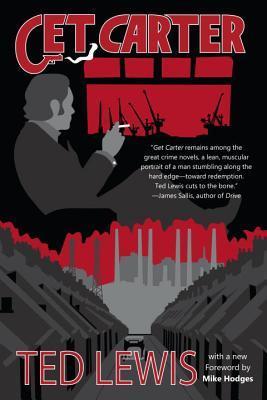
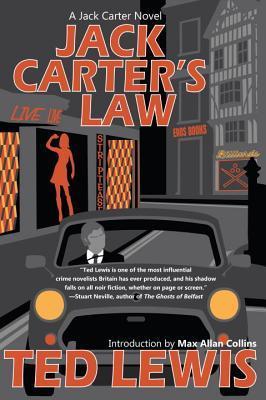
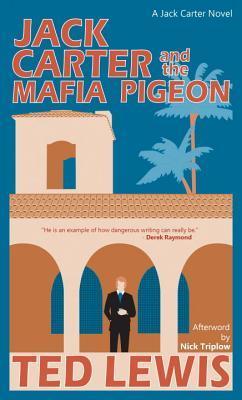
http://www.indiebound.org/book/978161...
http://www.indiebound.org/book/978161...
http://www.indiebound.org/book/978161...



http://www.indiebound.org/book/978161...
http://www.indiebound.org/book/978161...
http://www.indiebound.org/book/978161...
 Abysmal cover design, if I'm honest. Change the colour palette and, stylistically, they could easily pass as Patrick Nagel artwork for Duran Duran album covers which, in my own worthless opinion, ain't exactly the pinnacle of tasteful design.
Abysmal cover design, if I'm honest. Change the colour palette and, stylistically, they could easily pass as Patrick Nagel artwork for Duran Duran album covers which, in my own worthless opinion, ain't exactly the pinnacle of tasteful design.
Uh huh. Missed opportunity. Taking a lead from Caine's incarnation of Jack Carter or some of the classic photos of the Kray Twins could have made for much more iconic and appropriate covers. Ah well, we can't have everything I suppose.
Hard to better this really, innit....

Hard to better this really, innit....

From Syndicate Books...
In stores and on sale today: Get Carter returns to print and, for the first time ever, is available as an ebook.
Today's the day. Two years in the making. Syndicate's first book is on sale and what a book it is. Get Carter has been adapted to film no less than three times. It redefined British crime fiction on both page and screen. It is, as critic David L. Ulin of the Los Angeles Times wrote last week, "the place where British noir begins."
Yet in some strange twist of fate, it is also a novel that has languished out of print in North America for 40 years.
And now it's yours to read. Look also for the two other novels featuring Jack Carter (Jack Carter's Law and Jack Carter and the Mafia Pigeon) to release in October and November.
Jack's back. Let's keep it that way.
In stores and on sale today: Get Carter returns to print and, for the first time ever, is available as an ebook.
Today's the day. Two years in the making. Syndicate's first book is on sale and what a book it is. Get Carter has been adapted to film no less than three times. It redefined British crime fiction on both page and screen. It is, as critic David L. Ulin of the Los Angeles Times wrote last week, "the place where British noir begins."
Yet in some strange twist of fate, it is also a novel that has languished out of print in North America for 40 years.
And now it's yours to read. Look also for the two other novels featuring Jack Carter (Jack Carter's Law and Jack Carter and the Mafia Pigeon) to release in October and November.
Jack's back. Let's keep it that way.
Get the Michael Caine in Get Carter look...
Carter suits up for his vengeful journey home in a slick blue mohair three-piece suit that has become legendary. Last December, Will Hersey from Esquire ranked Carter’s suit as the fourth greatest suit in film history...
http://bamfstyle.wordpress.com/2014/0...
Carter suits up for his vengeful journey home in a slick blue mohair three-piece suit that has become legendary. Last December, Will Hersey from Esquire ranked Carter’s suit as the fourth greatest suit in film history...
http://bamfstyle.wordpress.com/2014/0...
Jack Carter Returns
“The rain rained.” It takes a tremendous amount of courage, or foolishness, to begin a book with such a sentence, but that’s how Ted Lewis kicked off Get Carter (originally titled Jack’s Return Home), the hugely influential 1970 British crime novel that spawned an iconic movie adaptation starring Michael Caine. Both book and movie chart the downward trajectory of the titular Jack Carter, an underworld “fixer,” as he tears through his hometown on a quest to punish the parties responsible for his brother’s death.
All these years later, Carter remains a vividly unsettling read—partly due to its ability to capture the idiosyncratic thought patterns of its protagonist. “Antihero” is perhaps too gentle a label for Jack; he is a brutal character who has no qualms about beating up women and murdering a man within shouting distance of his children. In any other context he would easily be considered one of the bad guys, but in this story he gets by on one redeeming trait: he is willing to risk everything—his job, his freedom, the life of the woman he loves, and, ultimately, his own life—in order to bring justice to his brother’s memory: a brother, it should be added, who was not a criminal, who abhorred violence, and from whom Jack had been estranged for over a decade. All of Jack’s ruthlessness and ferocity are bent into the service of this one honorable goal, which burns like a single white-hot ember in the depths of his dark, dead soul.
Get Carter is an electrifying, disorienting, and deeply disturbing book. It’s easily the most misogynistic thing I’ve ever read, and yet that aspect too rings true to character; we can’t realistically expect Jack Carter—a ’60s era mob enforcer with working class roots—to hold progressive views on gender equality. Modern novels that attempt such things—such as the plethora of recent Civil War books that feature sensitive Confederate soldiers who are surprisingly openminded about race relations—are an embarrassment to the writer’s craft. Lewis could have cared less about such things. He wanted to capture the true, oftentimes ugly, nature of the people around him, and make the reader care about them anyway.
Carter had an undeniable influence on much that came in its wake—from the novels of David Peace, James Sallis, and Dennis Lehane to the films of Guy Ritchie and Martin McDonagh. So it’s more than a little perplexing that this novel, along with the rest of Ted Lewis’s work, has been out of print in the U.S. for decades.
Or, rather, was out of print.
More here - and it's all well worth reading....
http://www.stkarnick.com/blog/post/ja...
“The rain rained.” It takes a tremendous amount of courage, or foolishness, to begin a book with such a sentence, but that’s how Ted Lewis kicked off Get Carter (originally titled Jack’s Return Home), the hugely influential 1970 British crime novel that spawned an iconic movie adaptation starring Michael Caine. Both book and movie chart the downward trajectory of the titular Jack Carter, an underworld “fixer,” as he tears through his hometown on a quest to punish the parties responsible for his brother’s death.
All these years later, Carter remains a vividly unsettling read—partly due to its ability to capture the idiosyncratic thought patterns of its protagonist. “Antihero” is perhaps too gentle a label for Jack; he is a brutal character who has no qualms about beating up women and murdering a man within shouting distance of his children. In any other context he would easily be considered one of the bad guys, but in this story he gets by on one redeeming trait: he is willing to risk everything—his job, his freedom, the life of the woman he loves, and, ultimately, his own life—in order to bring justice to his brother’s memory: a brother, it should be added, who was not a criminal, who abhorred violence, and from whom Jack had been estranged for over a decade. All of Jack’s ruthlessness and ferocity are bent into the service of this one honorable goal, which burns like a single white-hot ember in the depths of his dark, dead soul.
Get Carter is an electrifying, disorienting, and deeply disturbing book. It’s easily the most misogynistic thing I’ve ever read, and yet that aspect too rings true to character; we can’t realistically expect Jack Carter—a ’60s era mob enforcer with working class roots—to hold progressive views on gender equality. Modern novels that attempt such things—such as the plethora of recent Civil War books that feature sensitive Confederate soldiers who are surprisingly openminded about race relations—are an embarrassment to the writer’s craft. Lewis could have cared less about such things. He wanted to capture the true, oftentimes ugly, nature of the people around him, and make the reader care about them anyway.
Carter had an undeniable influence on much that came in its wake—from the novels of David Peace, James Sallis, and Dennis Lehane to the films of Guy Ritchie and Martin McDonagh. So it’s more than a little perplexing that this novel, along with the rest of Ted Lewis’s work, has been out of print in the U.S. for decades.
Or, rather, was out of print.
More here - and it's all well worth reading....
http://www.stkarnick.com/blog/post/ja...
 You, sir, are a gentleman of discriminating taste.
You, sir, are a gentleman of discriminating taste.Just finishing up Jack Carter & The Mafia Pigeon, m'self.
Thankee kindly Mark
I'm very much looking forward to both of them - and, of course, I have you to thank for highlighting the wonderful world of Ted Lewis. Thanks again for that. I shall report back.
I'm very much looking forward to both of them - and, of course, I have you to thank for highlighting the wonderful world of Ted Lewis. Thanks again for that. I shall report back.
 I think the same publisher will be rolling out Ted Lewis' final novel, GBH [1980], in the springtime. Well worth adding to your wish list.
I think the same publisher will be rolling out Ted Lewis' final novel, GBH [1980], in the springtime. Well worth adding to your wish list.
I'm about halfway through Jack Carter's Law...
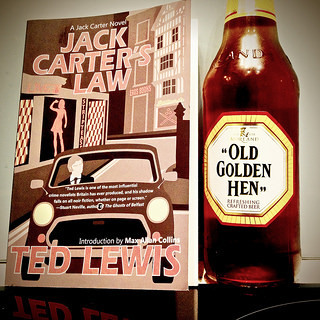
^ Beer and books. Is there a better combination?
As for Jack Carter's Law, it's like being beamed down into an episode of The Sweeney...
...blags, boozers, brasses, snouts, shooters, grasses...
Not a time I'd want to return to, but equally an era for which I have huge nostalgic affection.

^ Beer and books. Is there a better combination?
As for Jack Carter's Law, it's like being beamed down into an episode of The Sweeney...
...blags, boozers, brasses, snouts, shooters, grasses...
Not a time I'd want to return to, but equally an era for which I have huge nostalgic affection.
 Just saw that Soho Press is about to fling three more Ted Lewis titles at the public, these being Boldt, Plender and Billy Rags...
Just saw that Soho Press is about to fling three more Ted Lewis titles at the public, these being Boldt, Plender and Billy Rags...http://sohopress.com/authors/ted-lewis/
I can heartily recommend the latter two titles, Boldt less so. Not that Boldt was without its merit, but it was Lewis' attempt to write an "American" novel, without any concessions made to the language barrier [ie: the structure and grammar and slang was un-missably British throughout and, therefore, unconvincing].
Anyhow, damn good news for those amongst us looking to bulk-up our Lewis collections without tempting financial ruin.
^ This is indeed excellent news Mark and I shall be ordering all three. Looks like Soho are also publishing GBH, which I am especially keen to read.
Coincidentally I very recently finished...
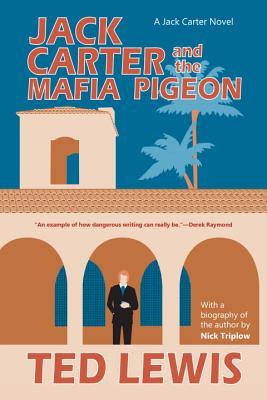
"Jack Carter's Law" by Ted Lewis
Click here to read my review
Coincidentally I very recently finished...

"Jack Carter's Law" by Ted Lewis
Click here to read my review
 I wholeheartedly agree with your Pigeon critique... it was a fun read, and a worthwhile read, but, ultimately, it was the weakest link in the Jack Carter chain.
I wholeheartedly agree with your Pigeon critique... it was a fun read, and a worthwhile read, but, ultimately, it was the weakest link in the Jack Carter chain.On the other hand, I can all but guarantee that you won't feel let down at all by GBH, which saw Lewis firing on all cylinders.
It's looking like all that remains for Soho Press to roll out are Rabbit -- which, yeah, I can absolutely recommend -- and All The Way Home & All The Night Through, his first, and the only one I've yet to read.
 Mark wrote: "Just saw that Soho Press is about to fling three more Ted Lewis titles at the public, these being Boldt, Plender and Billy Rags...
Mark wrote: "Just saw that Soho Press is about to fling three more Ted Lewis titles at the public, these being Boldt, Plender and Billy Rags...http://sohopress.com/authors/ted-lewis/
I can heartily recommend..."
Thanks, Mark, it's bookmarked for purchase in the next couple of weeks. Cannot wait.
What is it about brilliant writing and alcohol?
Men like Faulkner, Thomas, Poe, Chandler, Capote, Hemingway and Joyce were no stranger to the bottle. Meanwhile, Patricia Highsmith said that strong drink enabled her to “…see the truth, the simplicity, and the primitive emotions once more.” One of the giants of English Noir crime writing, Derek Raymond, seems to have been in an alcoholic haze for most of his adult life. So, what do we make of the short life of Ted Lewis who died at the tragically young age of 42 from an alcohol related illness?
Lewis was born in Manchester in 1940. His family moved to the Lincolnshire town of Barton-on-Humber in 1947, and Lewis’s formative years were spent in the distinctly unfashionable milieu of what we now call Humberside. Despite his parents’ objections, Lewis spent four years at Hull Art School. His experiences there make up the narrative of his autobiographical tale of young men and their relationships, All the Way Home and All the Night Through, which was published in 1965.
The start of an interesting article that you can continue reading here:
http://www.crimefictionlover.com/2015...
Concludes with...
So, what is Ted Lewis’s legacy? His writing lit a torch for those who sought to explore the darker places in men’s souls, and Raymond Chandler’s words, “The crime story tips violence out of its vase on the shelf, and pours it back down into the street where it belongs,” might be an appropriate epitaph. It may be that authors cannot write with the violent intensity that Lewis used and remain sociable and sane, but let the last words come from another Noir genius, Derek Raymond. In his afterword to GBH he said: “He is an example of how dangerous writing can be when it is done properly, and Ted Lewis’s writing proves he never ran away from the page. No – because with Ted Lewis, the page was the battle.”
Men like Faulkner, Thomas, Poe, Chandler, Capote, Hemingway and Joyce were no stranger to the bottle. Meanwhile, Patricia Highsmith said that strong drink enabled her to “…see the truth, the simplicity, and the primitive emotions once more.” One of the giants of English Noir crime writing, Derek Raymond, seems to have been in an alcoholic haze for most of his adult life. So, what do we make of the short life of Ted Lewis who died at the tragically young age of 42 from an alcohol related illness?
Lewis was born in Manchester in 1940. His family moved to the Lincolnshire town of Barton-on-Humber in 1947, and Lewis’s formative years were spent in the distinctly unfashionable milieu of what we now call Humberside. Despite his parents’ objections, Lewis spent four years at Hull Art School. His experiences there make up the narrative of his autobiographical tale of young men and their relationships, All the Way Home and All the Night Through, which was published in 1965.
The start of an interesting article that you can continue reading here:
http://www.crimefictionlover.com/2015...
Concludes with...
So, what is Ted Lewis’s legacy? His writing lit a torch for those who sought to explore the darker places in men’s souls, and Raymond Chandler’s words, “The crime story tips violence out of its vase on the shelf, and pours it back down into the street where it belongs,” might be an appropriate epitaph. It may be that authors cannot write with the violent intensity that Lewis used and remain sociable and sane, but let the last words come from another Noir genius, Derek Raymond. In his afterword to GBH he said: “He is an example of how dangerous writing can be when it is done properly, and Ted Lewis’s writing proves he never ran away from the page. No – because with Ted Lewis, the page was the battle.”
 I am no aficionado of noir - or even ordinary crime novels - but I have yielded to your collective enthusiasm and read Jack's Return Home. Delighted that I did. Thoroughly enjoyed it and will be looking out for more Ted Lewis. Review at: https://www.goodreads.com/review/show...
I am no aficionado of noir - or even ordinary crime novels - but I have yielded to your collective enthusiasm and read Jack's Return Home. Delighted that I did. Thoroughly enjoyed it and will be looking out for more Ted Lewis. Review at: https://www.goodreads.com/review/show...
Nigeyb wrote: "
By the by, Nick Triplow also mentioned that...
"Pretty much all of Ted Lewis's work is worth reading. GBH especially, in my view, set the tone for much of the modern crime/noir fiction which currently shifts loads in bookshops."
I can't find a copy for less that £40. A great shame because it sounds wonderful (as does Plender)."
I've finally got back to read our man Mr Lewis and specifically 'GBH'
My first impressions are very positive.
Slap bang back on top form.

As usual, Mark was spot on...
Mark wrote: "I can all but guarantee that you won't feel let down at all by GBH, which saw Lewis firing on all cylinders. "
Now then, I need to get hold of these two...
Mark wrote: "I It's looking like all that remains for Soho Press to roll out are Rabbit -- which, yeah, I can absolutely recommend -- and All The Way Home & All The Night Through, his first, and the only one I've yet to read."

By the by, Nick Triplow also mentioned that...
"Pretty much all of Ted Lewis's work is worth reading. GBH especially, in my view, set the tone for much of the modern crime/noir fiction which currently shifts loads in bookshops."
I can't find a copy for less that £40. A great shame because it sounds wonderful (as does Plender)."
I've finally got back to read our man Mr Lewis and specifically 'GBH'
My first impressions are very positive.
Slap bang back on top form.

As usual, Mark was spot on...
Mark wrote: "I can all but guarantee that you won't feel let down at all by GBH, which saw Lewis firing on all cylinders. "
Now then, I need to get hold of these two...
Mark wrote: "I It's looking like all that remains for Soho Press to roll out are Rabbit -- which, yeah, I can absolutely recommend -- and All The Way Home & All The Night Through, his first, and the only one I've yet to read."
'GBH' is Ted Lewis slap bang back to his best - at nearly the halfway point I declare it’s right up there with 'Get Carter' (1970, aka 'Jack's Return Home’).
After the discernible decline in quality that was 1977’s 'Jack Carter and the Mafia Pigeon (1977)’ I wondered if that book was the moment Ted lost his mojo. So far, it would appear emphatically not, 'GBH’ (1980) is classic Ted Lewis.
Sadly it was published just two years before his untimely death.

After the discernible decline in quality that was 1977’s 'Jack Carter and the Mafia Pigeon (1977)’ I wondered if that book was the moment Ted lost his mojo. So far, it would appear emphatically not, 'GBH’ (1980) is classic Ted Lewis.
Sadly it was published just two years before his untimely death.

I've finished...
'GBH'
Click here to read my review
Absolutely stunning. One of the best crime books I have ever read. The darkest possible shade of noir. I’m reeling. 'GBH' is extraordinary.
5/5
'GBH'
Click here to read my review
Absolutely stunning. One of the best crime books I have ever read. The darkest possible shade of noir. I’m reeling. 'GBH' is extraordinary.
5/5
 Nigeyb,
Nigeyb,I have just finished reading "GBH" at your recommendation, and like you, am reeling from it. Absolutely brilliant, and unbearably bleak.
 Here’s a forthcoming title that should be worth looking forward to... Getting Carter: Ted Lewis and the Birth of Brit Noir, by Nick Triplow, set for publication 26 October 2017.
Here’s a forthcoming title that should be worth looking forward to... Getting Carter: Ted Lewis and the Birth of Brit Noir, by Nick Triplow, set for publication 26 October 2017.From the publisher, No Exit Press:
'Get Carter' are two words to bring a smile of fond recollection to all British film lovers of a certain age.
The cinema classic was based on a book called Jack’s Return Home, and many commentators agree contemporary British crime writing began with that novel. The influence of both book and film is strong to this day, reflected in the work of David Peace, Jake Arnott, Russell Lewis and the likes. But what of the man who wrote this seminal foundation work?
Ted Lewis is one of the most important writers you've never heard of. Born in Manchester in 1940, he grew up in the tough environs of postwar Humberside, attending Hull Art School before heading for London. His life described a cycle of obscurity to glamour and back to obscurity, followed by death at only 42. He sampled the bright temptations of sixties London while working in advertising, TV and films; he encountered excitement and danger in Soho drinking dens among various gangland haunts. He wrote for Z Cars and had some eight books published. Alas, the life of Ted Lewis fell apart, his marriage ended and he returned to Humberside and an all too early demise.
Getting Carter is a meticulously researched and riveting account of the career of a doomed genius. Long-time admirer Nick Triplow has fashioned a thorough, sympathetic and unsparing narrative. The story of Ted Lewis carries historical and cultural resonances for our own troubled times.
Required reading for noirists, Getting Carter will enthral and move anyone who finds irresistible the old cocktail of rags to riches to rags.
A few more details here: http://www.noexit.co.uk/getting-carter
Great news Mark - thanks for the update. That Nick Triplow biog has been in the offing for a few years now.
I've set up Getting Carter: Ted Lewis and the Birth of Brit Noir on GoodReads too...
https://www.goodreads.com/book/show/3...
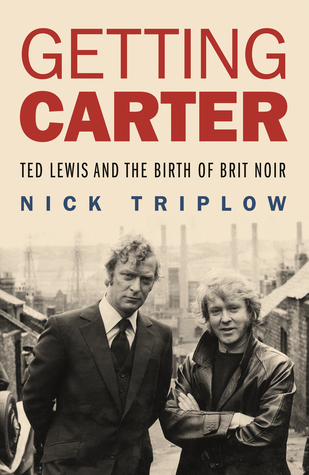
I've set up Getting Carter: Ted Lewis and the Birth of Brit Noir on GoodReads too...
https://www.goodreads.com/book/show/3...

 There's absolutely zero chance of a stateside publication, I'm sure, but here's hoping for an eventual --and less expensive-- paperback edition.
There's absolutely zero chance of a stateside publication, I'm sure, but here's hoping for an eventual --and less expensive-- paperback edition.
Getting Carter: Ted Lewis and the Birth of Brit Noir will be released on 26 October 2017.
Joy is unconfined
Here's a review by Andy Lawrence...
http://www.crimetime.co.uk/getting-ca...
Nick Triplow’s meticulously researched biography is the definitive account of Lewis’ life and his work’s continued relevance. The book is a nuanced study of a tortured soul that is as compelling and rich as anything written by Lewis.
Joy is unconfined
Here's a review by Andy Lawrence...
http://www.crimetime.co.uk/getting-ca...
Nick Triplow’s meticulously researched biography is the definitive account of Lewis’ life and his work’s continued relevance. The book is a nuanced study of a tortured soul that is as compelling and rich as anything written by Lewis.
 Yeah, I was, but then I got sidetracked by Nick Triplow's 2012 debut novel, Frank’s Wild Years, which looks pretty tasty... so I've ordered a cheap secondhand copy of that for now. I'll eventually buy a copy of his Lewis biography, but am trying to curb my reactionary purchases in the hope [in the knowledge?] that it'll eventually be available cheaper than seventeen quid plus postage.
Yeah, I was, but then I got sidetracked by Nick Triplow's 2012 debut novel, Frank’s Wild Years, which looks pretty tasty... so I've ordered a cheap secondhand copy of that for now. I'll eventually buy a copy of his Lewis biography, but am trying to curb my reactionary purchases in the hope [in the knowledge?] that it'll eventually be available cheaper than seventeen quid plus postage.
Books mentioned in this topic
All the Way Home and All the Night Through (other topics)GBH (other topics)
Plender (other topics)
Jack Carter and the Mafia Pigeon (other topics)
Getting Carter: Ted Lewis and the Birth of Brit Noir (other topics)
More...
Authors mentioned in this topic
Ted Lewis (other topics)Nick Triplow (other topics)
Ted Lewis (other topics)
Ted Lewis (other topics)
Nick Triplow (other topics)
More...







Ted Lewis on location during filming for the classic film version of his book "Get Carter"
What some of the denizens of "The Patrick Hamilton Appreciation Society" say about Ted Lewis...
Mark wrote: "Apart from 'Boldt,' I can recommend all of his books with supreme confidence. Tough, terse, tense and evocative. Grim, but fun. I've never been able to work out why his stuff is mainly out of print... if there was any justice, he'd be a staple of every crime-writing library."
CQM wrote: "I don't read many books twice but I've been back to Get Carter a few times. Unfortunately (or not) the copy I have is an old film tie in copy with boobs on the back cover. Awkward on the train."
Get Carter
"Ted Lewis was one of the first British writers in the sixties to take Chandler literally—"The crime story tips violence out of its vase on the shelf and pours it back into the street where it belongs"—and Get Carter is a book that I and plenty of other people at the time considered to be a classic on these grounds."
- Derek Raymond, author of the Factory Novels
The Man Behind Get Carter: Ted Lewis by Brian Greene
Ted Lewis, the man who wrote so convincingly about London-based gangsters, came of age in the same small North Lincolnshire town where he later went down in flames. Lewis continued to live in Barton-Upon-Humber while attending Hull College of Art, commuting across the Humber estuary via ferry. After years of living in London and other parts of England while working in advertising, then illustration and animation, and finally as a professional writer, he returned to Barton when his marriage collapsed. When Lewis died in 1982, just 42, it seems the only people to attend the funeral - besides his own immediate family members - were friends from Barton.
Many of Lewis's friends from boyhood days (they knew him as Edward, or Lew) got reacquainted with him over the last few years of his life. Their remembrances of Lewis and his time in Barton create a picture of a man whose personal life appears as complicated as his literary work is undervalued.
Even friends who had a rough time being in Lewis's company in his later years remember young Edward fondly. "A lovely looking little boy," one woman recalls, "very angelic with blonde hair in a little quiff. Couldn't help but like him." But the likeable boy also wanted to make sure people understood he was rugged. This same lady recalls young Edward showing a kind of stubborn toughness in the classroom:
"I remember once he caught his finger in a satchel ring, agonizingly, and never uttered a word or groan, even when the ring was prized apart. It must have really, really hurt, but he wouldn't have shown weakness to anyone. Guess that was his trouble." Further proof that Edward wanted to be seen as a tough guy is revealed by his mother's once telling a friend of his, "He always wanted to be James Dean."
One friend remembers a life-changing incident involving Lewis and the headmaster at Barton Grammar School. Just recently back to school after suffering a spell of rheumatic fever, Lewis, who was carrying on in the cafeteria, had his face slapped by the official. If being struck in that way as a public spectacle wasn't humiliation enough, the still weak-bodied boy wet himself for all to see.
Public humiliation, and how it can harden its youthful victims, is a theme that comes into play in many of Lewis's novels. Billy Cracken, the anti-hero from Billy Rags, is beaten up by a tougher boy in front of a small crowd, and the already-rugged lad becomes all the more committed to making himself mean. In Plender, young Brian Plender is debased in a variety of ways by schoolmate Peter Knott, and when the two meet up again as adults, Plender seeks revenge. Much of the reason Jack Carter becomes involved in the underworld is because of the time, as told in Jack's Return Home, when he watches a thug taunt his brother Frank in a snooker hall; Frank doesn't stick up for himself, and Jack decides at that moment that he is going to be the perpetrator of any bullying that happens in his life. The face-slapping incident itself is referred to in Lewis's vastly underappreciated autobiographical novel The Rabbit.
Sometime after the episode with the headmaster, Lewis took up with a pack of lads one Bartonian calls "The Riverbank Boys." This was a group of six or seven teens, all of them at least a few years older than Lewis. They liked to hang out around the banks of the River Humber, or at the pub, drinking and acting out scenes from the B-movies they watched together at the local cinema. One of Lewis's friends, a Riverbank Boy himself, reflects, "He possibly felt he had to prove himself, being younger and smaller, and as a result tended to push himself further than the rest, be it climbing trees, smoking, drinking, etc."
Another influential development in Lewis's teen years was the mentorship of Henry Treece. A novelist and poet who taught English at Barton Grammar, Treece recognized general artistic potential in Lewis (who had a talent for the visual arts and was a jazz pianist, in addition to his writing skill). Treece sometimes read from Raymond Chandler to his pupils, using an American accent
An event which caused him to become withdrawn from his same-age peers, a diet of B-movies and Chandler novels, an accomplished tutor guiding him towards creative expression . . . Edward Lewis was becoming Ted.
By all accounts, the last years of Lewis's life were not an easy time for old friends to be around the man - whom they described as "an affable sort," and "good company," when he was younger. His drinking was now a debilitating habit, his behavior erratic, and it seems he was not someone you wanted to let your wife or girlfriend spend much time around. One Bartonian, who was in Lewis's company often through these years, paints a picture of latter-day Ted in his about-town mode:
"The pubs used to have pianos in them. Ted was always there, playing the piano. One thing he'd do, if he was down – you know, blue – he'd come into the pub and start playing funeral marches, dirges. One time a bloke who was in there trying to have a good time walked over and slung him off the piano, because he was bringing everybody down with that music."
But this same friend tells of another time over that period when he and Lewis were celebrating his own 40th birthday: Ted didn't have money to buy a gift for the man -who was once a drummer in an early rock 'n' roll band, - so instead drew him a picture that had his friend playing drums in a band whose piano player was Little Richard.
Many of these friends of Ted Lewis's bemoan how little recognition the writer gets around his hometown. There is no public plaque, or other commemorative token, around Barton to honor the man who is credited with inventing the British school of hardboiled crime fiction. Writing the book that was the basis of the highly-acclaimed film Get Carter, doing animation work on the Beatles' Yellow Submarine movie – not good enough, apparently. One Bartonian suggests the town might feel somewhat disappointed in Lewis:
"When you come from a small town like this, and when you've got good looks like his, and you can the play the piano like he did, and you go off and write the books and all – you're going to become kind of a legend at home. So he kind of had it all, but then he threw it all away, didn't he?"
But was it really just self-indulgence in Lewis that brought on his hopeless alcoholism, which in turn led to the collapse of his family life and early death? Lewis confided in one of his friends as early as 1963 that he suffered from bouts of depression, which he called "the doom." He later confessed to this same man that he "needed to drink to write." Even in grammar school days, one female friend noted "He was full of anger and black moods," while another woman remembers schoolboy Edward as "a quiet rebel, really . . . a kind of dark angel, out of his time." The books are filled with mental anguish, profound guilt, and people who can never quite come to peace with those closest to them – the novels read like they could only have come off the pen of a tormented soul.
It must have been difficult to be Ted Lewis then. Once a hot-shot novelist with an enviable publishing contract, Lewis now found himself taking on a job making postcards for the local council for a meager amount of pay. Ted was obsessed with the landscape of North Lincolnshire and enjoyed making the cards, but still he must have felt ashamed over what he was paid for this gig. A friend says of that project:
"In fact the postcards were a smaller version of the huge original posters he made in pen and ink. They must have taken him hours and hours. It was an appallingly trivial sum of money to offer him – but Bertha [Ted's mother] said he needed the money and I guess it stopped him drinking for a short time."
The same woman who tells of the postcard assignment relates that Lewis seems to have made an effort to find spiritual solace in his last days:
"Apparently the atheist he always proclaimed to be – right from school days – it appeared he tried to change and 'find God' or something to believe in during those last months. He began seeking help from a priest in Scunthorpe and helped the priest in practical ways around the church, by cleaning inside the church and clearing up detritus – sweeping leaves and tidying graves. I guess it was his way of seeking what had been missing in his life in so long. He must have been full of regrets and sadness."
Lewis's last (and arguably strongest) book, Grievous Bodily Harm, is an account of a man who is watching his personal world shatter. Blue movie racketeer George Fowler knows he brought his demise onto himself to a great extent, but that doesn't make his horrifying awareness of it any less acute. Fowler is tucked away at a seaside hideout, taking refuge from the city and all the people there who want to do him in. He is also holding his own internal demons at bay, using alcohol to quiet the mounting roar that threatens to erupt in his psyche.
It's not a stretch to imagine that the hideout in the book represents Barton-Upon-Humber as Lewis knew it in his last years, and that the Smoke (the city) references all his time in London and other places. He was letting out a last cry from Hell in his own hometown.
http://www.crimetime.co.uk/mag/index....